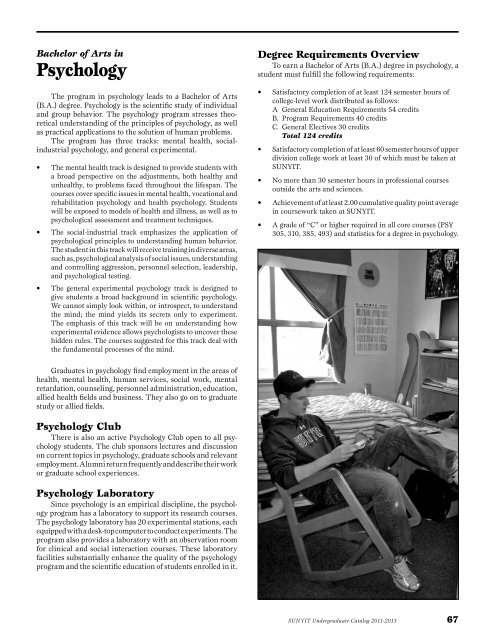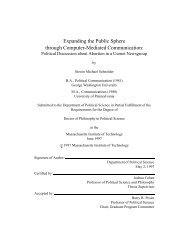Undergraduate Catalog 2011-2013 - SUNY Institute of Technology
Undergraduate Catalog 2011-2013 - SUNY Institute of Technology
Undergraduate Catalog 2011-2013 - SUNY Institute of Technology
You also want an ePaper? Increase the reach of your titles
YUMPU automatically turns print PDFs into web optimized ePapers that Google loves.
Bachelor <strong>of</strong> Arts in<br />
Psychology<br />
The program in psychology leads to a Bachelor <strong>of</strong> Arts<br />
(B.A.) degree. Psychology is the scientific study <strong>of</strong> individual<br />
and group behavior. The psychology program stresses theoretical<br />
understanding <strong>of</strong> the principles <strong>of</strong> psychology, as well<br />
as practical applications to the solution <strong>of</strong> human problems.<br />
The program has three tracks: mental health, socialindustrial<br />
psychology, and general experimental.<br />
• The mental health track is designed to provide students with<br />
a broad perspective on the adjustments, both healthy and<br />
unhealthy, to problems faced throughout the lifespan. The<br />
courses cover specific issues in mental health, vocational and<br />
rehabilitation psychology and health psychology. Students<br />
will be exposed to models <strong>of</strong> health and illness, as well as to<br />
psychological assessment and treatment techniques.<br />
• The social-industrial track emphasizes the application <strong>of</strong><br />
psychological principles to understanding human behavior.<br />
The student in this track will receive training in diverse areas,<br />
such as, psychological analysis <strong>of</strong> social issues, understanding<br />
and controlling aggression, personnel selection, leadership,<br />
and psychological testing.<br />
• The general experimental psychology track is designed to<br />
give students a broad background in scientific psychology.<br />
We cannot simply look within, or introspect, to understand<br />
the mind; the mind yields its secrets only to experiment.<br />
The emphasis <strong>of</strong> this track will be on understanding how<br />
experimental evidence allows psychologists to uncover these<br />
hidden rules. The courses suggested for this track deal with<br />
the fundamental processes <strong>of</strong> the mind.<br />
Degree Requirements Overview<br />
To earn a Bachelor <strong>of</strong> Arts (B.A.) degree in psychology, a<br />
student must fulfill the following requirements:<br />
• Satisfactory completion <strong>of</strong> at least 124 semester hours <strong>of</strong><br />
college-level work distributed as follows:<br />
A General Education Requirements 54 credits<br />
B. Program Requirements 40 credits<br />
C. General Electives 30 credits<br />
Total 124 credits<br />
• Satisfactory completion <strong>of</strong> at least 60 semester hours <strong>of</strong> upper<br />
division college work at least 30 <strong>of</strong> which must be taken at<br />
<strong>SUNY</strong>IT.<br />
• No more than 30 semester hours in pr<strong>of</strong>essional courses<br />
outside the arts and sciences.<br />
• Achievement <strong>of</strong> at least 2.00 cumulative quality point average<br />
in coursework taken at <strong>SUNY</strong>IT.<br />
• A grade <strong>of</strong> “C” or higher required in all core courses (PSY<br />
305, 310, 385, 493) and statistics for a degree in psychology.<br />
Graduates in psychology find employment in the areas <strong>of</strong><br />
health, mental health, human services, social work, mental<br />
retardation, counseling, personnel administration, education,<br />
allied health fields and business. They also go on to graduate<br />
study or allied fields.<br />
Psychology Club<br />
There is also an active Psychology Club open to all psychology<br />
students. The club sponsors lectures and discussion<br />
on current topics in psychology, graduate schools and relevant<br />
employment. Alumni return frequently and describe their work<br />
or graduate school experiences.<br />
Psychology Laboratory<br />
Since psychology is an empirical discipline, the psychology<br />
program has a laboratory to support its research courses.<br />
The psychology laboratory has 20 experimental stations, each<br />
equipped with a desk-top computer to conduct experiments. The<br />
program also provides a laboratory with an observation room<br />
for clinical and social interaction courses. These laboratory<br />
facilities substantially enhance the quality <strong>of</strong> the psychology<br />
program and the scientific education <strong>of</strong> students enrolled in it.<br />
<strong>SUNY</strong>IT <strong>Undergraduate</strong> <strong>Catalog</strong> <strong>2011</strong>-<strong>2013</strong> 67
















